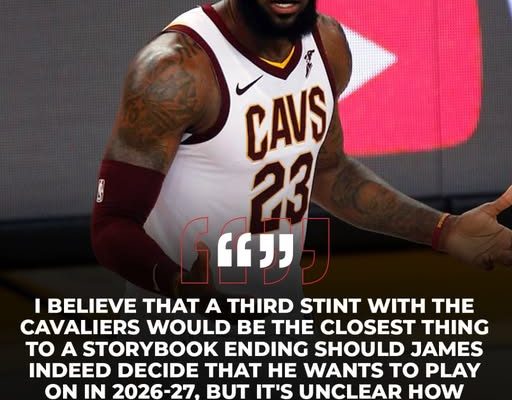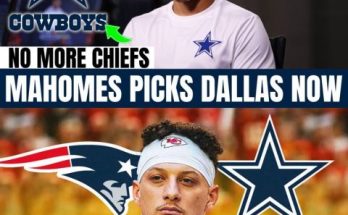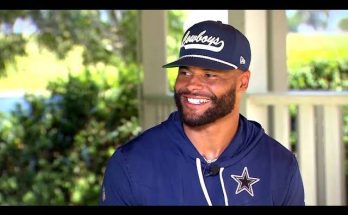LeBron James going back to the Cleveland Cavaliers would be a cinematic ending to a GOATed career in a way that transcends basketball, time, and legacy. In the annals of sports history, few stories carry the gravity, complexity, and emotional pull of LeBron’s relationship with Cleveland. It is a relationship marked by prodigy and promise, heartbreak and betrayal, redemption and deliverance. To imagine LeBron concluding his illustrious career where it all began is to imagine the final scene in an epic film that spans decades, cities, championships, and revolutions in the game. And yet, this final act, should it materialize, would not just be symbolic—it would be profound in every way that matters.
LeBron James is not just an NBA superstar. He is a global icon, a living monument to greatness, and arguably the most complete basketball player the game has ever seen. Drafted first overall in 2003 by the Cleveland Cavaliers, LeBron didn’t just enter the league with hype—he entered with destiny. From the beginning, there was a weight on his shoulders that no teenager should have had to carry. Yet, he carried it with grace and gravity. The early years in Cleveland were defined by his rapid rise: Rookie of the Year, All-Star selections, playoff berths, and ultimately an NBA Finals appearance in 2007 with a roster that had no business being on that stage. What LeBron did for the Cavaliers in his first stint was more than make them competitive; he made them relevant, watchable, and aspirational.
But as the seasons wore on, the failures to deliver a championship became the narrative. Cleveland’s front office struggled to surround LeBron with the kind of talent necessary to win. Despite his individual brilliance, the ceiling for the Cavs remained too low. The infamous “Decision” in 2010 saw LeBron leave Cleveland for the Miami Heat—a move that angered many, devastated others, and birthed a new version of LeBron: one hardened by media backlash, fueled by the need to prove he could win, and transformed into a lethal, calculating champion. In Miami, LeBron collected two NBA titles and appeared in four straight Finals, cementing his status among the game’s immortals.
And yet, even in the success, something was missing. LeBron never forgot home. He never forgot the kid from Akron who once dreamed of lifting a trophy in Cleveland. In 2014, when he chose to return to the Cavaliers, it was not just a basketball decision; it was a human one. It was about mending wounds, healing a city, and finishing what he started. His letter, published in Sports Illustrated, remains one of the most powerful declarations of purpose in sports history. His return was not a retreat but an arrival. He came back to deliver, and in 2016, he did.
That 2016 NBA Finals triumph over the 73-9 Golden State Warriors will forever be etched in the pantheon of sports moments. Down 3–1 in the series, facing the greatest regular-season team of all time, LeBron led the Cavaliers to three straight victories, including a Game 7 masterpiece at Oracle Arena. The chase-down block on Andre Iguodala, the triple-double, the tears on the court—those were not just plays or statistics; they were emotional exorcisms. He had finally done it. He had brought Cleveland its first major sports championship in over 50 years. That ring meant more than gold—it was a symbol of promise kept and legacy solidified.
Since then, LeBron has gone on to add another chapter with the Los Angeles Lakers, where he won the 2020 NBA title in the bubble. His stint in L.A. has been both fruitful and complex, marked by both triumph and turmoil, injury and influence. Yet as his career winds down and the reality of his eventual retirement becomes more imminent, the question lingers: How should it end?
For many, greatness is validated by statistics, accolades, and rings. LeBron has them all. He is the NBA’s all-time leading scorer. He has four championships, four MVPs, countless All-Star selections, and a resume that defies comparison. But what separates legends from mythological figures is how the story concludes. In the modern NBA, few careers are completed where they started. Stars move, dynasties break, and loyalty often takes a backseat to business. Yet in LeBron’s case, a return to Cleveland to end it all would be more than nostalgia—it would be poetic justice.
Imagine LeBron, at age 41 or 42, wearing the wine and gold one last time in front of a Cleveland crowd that once burned his jersey, only to later worship him as a savior. Imagine him mentoring the next generation of Cavaliers—perhaps even sharing the court with his son Bronny if fate allows. Imagine the farewell tour, the standing ovations in every NBA arena, the final home game in Rocket Mortgage FieldHouse with fans chanting his name in unison. That is not just a send-off; that is a coronation. It’s a celebration of a career that spanned eras, conquered coasts, and redefined basketball.
More than just emotion, there are practical reasons why this return could work. The Cavaliers are a competitive team with young talent like Darius Garland, Evan Mobley, and potentially Donovan Mitchell if he remains. LeBron wouldn’t need to be the focal point. He could take on the role of elder statesman, still capable of brilliance on any given night, but with the wisdom to defer and elevate those around him. It would be the ultimate full-circle moment: the prodigy returns not to carry, but to guide.
Furthermore, Cleveland is home in more ways than one. LeBron’s off-court ventures—his foundation, his schools, his philanthropic commitments—are deeply rooted in Ohio. A return would not just be about basketball. It would be a statement about values, loyalty, and meaning. In an era where player movement is frequent and sentimental connections are often discarded, LeBron choosing to retire in Cleveland would stand as a defiant act of love.
Critics might argue that fairy tales rarely happen in sports. Injuries, front-office dynamics, and the relentless ticking of time might prevent such an ending. But if anyone has defied the odds repeatedly, it’s LeBron James. He was never supposed to live up to the hype—and yet he surpassed it. He wasn’t supposed to return to Cleveland—and yet he did. He wasn’t supposed to beat that Warriors team—and yet he willed it into existence. So why not believe in one final twist, one last chapter that completes the circle?
LeBron’s career is already GOATed, depending on how you define greatness. For many, he’s the most complete player to ever pick up a basketball. For others, he’s second only to Michael Jordan. But legacy isn’t just built on numbers; it’s built on impact, on story, on heart. A career that began with the weight of expectation and saw detours through triumph and pain deserves to end with dignity, familiarity, and love. Cleveland gave him his first chance. He gave them a reason to believe. It would be right for it all to end where it began.
In the history books, there will be plenty of metrics used to judge LeBron’s career. But in the hearts of fans, it will always come down to the moments he gave them—the joy, the heartbreak, the return, the block, the championship. A final goodbye in Cleveland would not erase the years in Miami or Los Angeles; it would elevate them. It would tell the world that for all the fame and fortune, for all the banners raised in other cities, there was always one place that held his soul.
LeBron James returning to the Cavaliers one final time is more than just a storybook ending—it’s destiny. And when the final buzzer sounds on his last game, in front of the fans who watched the boy become a king, it won’t just be the end of a career. It will be the end of a legend written in real time, one that will echo through arenas and memories for generations to come.



